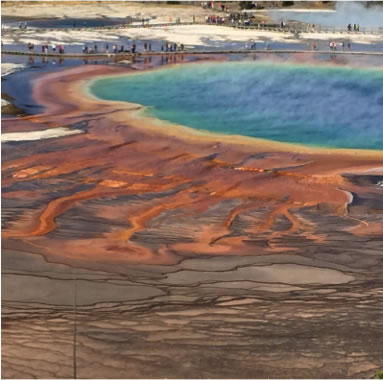 |
|
|
Fall 2015 A Word From The Director Dear Astrobiology Enthusiasts, Our last year was a productive and exciting one! We graduated five students: Regina Carns (Earth & Space Sciences and Astrobiology), Wolf Clifton (Museology and Astrobiology Certificate), Kelly Hillbun (Earth & Space Sciences and Astrobiology), Amit Misra (Astronomy and Astrobiology), and Meg Smith (Earth and Space Sciences and Astrobiology Certificate). Several of our recent former graduates have received prestigious appointments in the last year: Aomawa Shields (Astronomy & Astrobiology) won dual postdoc appointments at Harvard and UCLA, and was named a 2015 TED Fellow. Mark Claire, former UWAB graduate student in astronomy and VPL postdoc, received a multi-million dollar European Research Council grant to study the evolution of Earth's atmosphere. Mark thanks the UW Astrobiology Program for giving him “field cred” and his start on isotope geochemistry during his UWAB research rotation! Tyler Robinson (Astronomy & Astrobiology) was awarded a NASA Sagan Fellowship and will work at the University of California at Santa Cruz developing state-of-the-art cloud models for exoplanets. David Smith (Earth and Space Sciences), now at NASA Ames, led the E-MIST balloon mission studying the survival of microbes in the stratosphere. We welcomed many new faces this year! This year's six new students working toward a Dual-Title PhD are Michael Diamond (Atmos Sciences and Astrobiology), Andrew Lincowski (Astronomy and Astrobiology), Owen Lehmer (Earth and Space Sciences and Astrobiology), Robert Tournay (School of Environmental and Forest Sciences and Astrobiology), Diana Windemuth (Astronomy and Astrobiology), and Jon Zaloumis (Earth and Space Sciences and Astrobiology). In addition, Jacqui Saunders (Oceanography), Nichole Barry (Physics) and Marshall Styczinski (Physics) joined as Astrobiology Certificate students. Thanks to our students, researchers, and faculty, we continue to advance the field of astrobiology with remarkable discoveries. See the newsletter sidebar for highlights of our many scientific publications this year. Our exoplanet researchers are working to understand how to characterize Earthlike worlds using surface reflectance biosignatures, planetary color, and signs of volcanic activity. UW Astrobiology is at the forefront of disentangling planetary processes that mimic signs of life from real biosignatures, so that we can more accurately interpret the information we will get from exoplanets. Our big results this year were in finding several plausible ways a planet could generate atmospheric oxygen without a photosynthetic biosphere, allowing us to be better prepared to interpret what we eventually see in exoplanet spectra. On the geophysics side, we are working to understand early Earth environments and to pinpoint the advent of early life processes such as the ability to use nitrogen. Although our faculty and researchers have been very successful in securing research funding for our program, we still face considerable challenges in obtaining funding for program needs that cannot be covered by federal research grants or State education funding. These include funds and scholarships for student recruitment, as we often compete for our students with wealthier institutions such as Harvard and Caltech. We also need graduate scholarships to support interdisciplinary exploration by our students; additional support for student participation in our highly-acclaimed astrobiology research rotations and workshops, and funds to bring speakers to the UW for our colloquia and public events. Please consider making a donation to support the Program! We have several outreach activities planned as well, with the NASA Astrobiology Debates hosted at UW this weekend, and the spectacular “Origins: Life and the Universe” concert at Benaroya Hall on November 7th, featuring original compositions and scientific imagery. We will continue to offer our Astrobiology Colloquium Series in Spring and Fall of 2015, with cutting edge astrobiology research presented by visiting and local experts. These presentations are pitched to be accessible to an interdisciplinary audience. Select talks in this series are webcast and recorded by the NASA Astrobiology Institute and can be viewed live on your web-browser, or the recordings can be accessed at any time later (instructions on how to join in are provided in the Newsletter sidebar). Click here for the full Fall 2015 colloquium lineup. I wish you all a year of discovery and new insights, and I hope to see you at some or all of these events! Prof. Victoria Meadows Photo:The Grand Prismatic Hot Spring as viewed from above on our workship this year to Yellostone National Park. |
|

